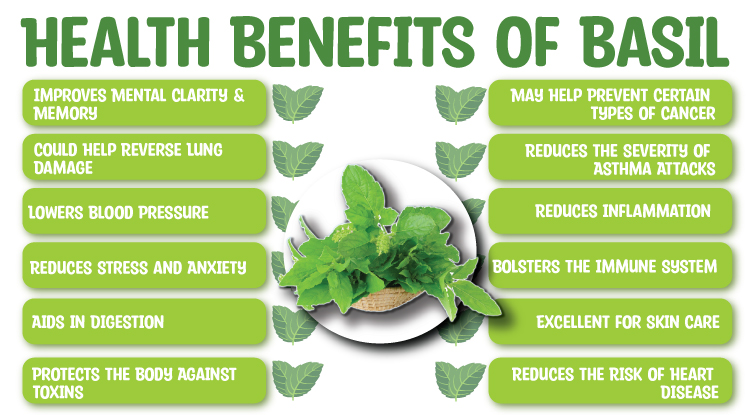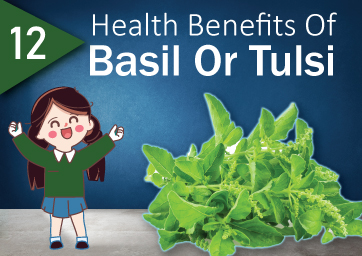Nutrition Value of Basil Or Tulsi
Holy basil provides a little nutritional boost, but its main uses are related to its possible health advantages rather than its flavour. A quarter cup of fresh leaves, for example, provides an impressive quantity of vitamin K—nearly meeting your daily required intake—in a little meal. These vitamins are essential for healthy bones and blood clotting. It also provides trace levels of minerals that support several body processes like calcium, magnesium, iron, and phosphorus regulation.
Additionally, holy basil contains vitamins A and C, which are vital antioxidants for healthy cells and the immune system. While you'd normally use a very tiny quantity of holy basil as a flavouring, these advantages are most noticeable when ingesting it in its concentrated form, such as in teas or supplements.
Two tablespoons (five grams) of freshly chopped basil include the following:
Most Common Varieties of Basil
Basil comes in different varieties, depending on where it is grown. Here are the five most common varieties of Basil:
Genovese Basil - This variety is commonly known for its sweet flavour. It grows well in hot weather and tolerates dry conditions.
Thai Basil - This variety is widely grown throughout tropical regions and thrives in warm temperatures. Its flavour is similar to lemongrass, making it perfect for cooking Asian-inspired dishes.
Sweet Basil - This variety is often referred to as Italian. It has a milder flavour than regular Basil and is added to salads and pasta dishes.
Holy Basil - This variety has an intense fragrance that resembles lemongrass. It's suitable for adding a unique flavour to curries and stews.
Purple Basil - This variety has a strong, pungent aroma and taste. It's best suited for sauces and dishes whose spicy flavour adds extra depth.
Traditional Use of Tulsi or Basil
Tulsi has been traditionally used since ancient times for medicinal purposes. Its use is mentioned in Ayurveda texts dating back to 4000 BC. Tulsi is said to have soothing effects on the brain and nervous system.
In India, it is used to treat anxiety, insomnia, depression, headache, fever, cough, cold, flu, indigestion, inflammation, and skin-related problems. Tulsi has antibacterial, anti-fungal, antiviral, anti-inflammatory, and antioxidant properties.
12 Health Benefits of Basil (Tulsi)
Basil is packed with nutrients, vitamins, and antioxidants, which makes it an excellent choice for boosting your overall health. Below we have listed 12 excellent health benefits of Basil.

1. Reduces Inflammation
Basil is excellent for reducing inflammation. It contains several antioxidants and polyphenols, which help to fight inflammation in the body. So if you're looking for a natural way to reduce inflammation, Basil is a great choice.
2. Bolsters the Immune System
If you're feeling run down lately, Basil can help give your immune system a boost. Basil is a natural antibacterial and antiviral agent that helps fight off infection. It's also rich in antioxidants, which help protect your cells from damage.
3. Protects the Body Against Toxins
Tulsi is also a powerful antioxidant that helps to fight free radicals, neutralize harmful toxins, and protect cells from damage. It is a natural detoxifier that helps cleanse the liver and kidneys.
Adding it to the diet purifies the blood, removes toxins from the body, and also protects the body against external toxins, such as heavy metals and pesticides.
4. Aids in Digestion
One of the top health benefits of Basil is that it aids digestion. When you're feeling bloated or constipated, a cup of basil tea can help to get things moving again. It also works its magic to treat an upset stomach.
5. Reduces Stress and Anxiety
When you're feeling stressed and overwhelmed, chew on some basil leaves. The herb has a long history of reducing stress and anxiety. It's one of the most commonly used herbs in Ayurvedic medicine for this very purpose.
Basil is a natural relaxant and can help to soothe the nervous system. It's also been shown to help reduce blood pressure and slow heart rate. If you're feeling frazzled, reach for a handful of fresh basil leaves and take a few deep breaths. You'll feel better in no time.
6. Lowers Blood Pressure
Did you know that Basil can help lower your blood pressure?
Basil is an excellent source of magnesium, which is known to help regulate blood pressure. And when it comes to keeping your blood pressure in check, every little bit helps.
7. Improves Mental Health
One of the best benefits of Basil is that it improves mental clarity and memory.
Basil contains eugenol, a compound with anti-inflammatory and analgesic properties. Eugenol also helps improve blood circulation to the brain, resulting in better cognitive function.
So if you're looking for a herb that can help improve your mental clarity and memory, tulsi is a great choice. Add it to your tea or food, or take it in supplement form to get the most benefit.
8. Reduces the Severity of Asthma Attacks
Tulsi is a natural antihistamine. It can help reduce as well as prevent the severity of asthma attacks. Tulsi is also an excellent natural remedy for colds and flu. So next time you're feeling under the weather, go ahead and treat yourself to a warm cup of basil tea.
9. May Help Prevent Certain Types of Cancer
Basil is high in antioxidants, which neutralize and eliminate dangerous toxins in the body that can cause cancer. Further, its natural anti-inflammatory properties help to reduce the risk of cancer developing in the first place. So add more cancer-fighting firepower to your diet with some basil.
10. Prevention from Lung Damage
Strong antioxidants like Basil can help with lung health and disease prevention. Tulsi is also excellent for removing foul breath because it helps to cleanse the lungs.
11. Reduces the Risk of Heart Disease
If you want to keep your heart healthy and strong, consider adding Basil to your diet. Basil is packed with antioxidants, which help to fight the damage caused by free radicals.
Free radicals can cause all sorts of problems in the body, including heart disease. But by including Basil in your diet, you can help to reduce the risk of developing this serious condition.
12. Excellent for Skin Care
Basil is one of the best herbs for skin care. It helps clear acne, reduces scars, treats eczema, and relieves psoriasis. Basil oil is excellent for any skin condition. Its anti-inflammatory and antibacterial properties help heal wounds and prevent infection.
Basil Diet
Basil can go with just about anything. But wash them thoroughly before eating them raw or adding them to your diet. Wash them thoroughly. Also, smaller pieces allow you to enjoy them well, so finely cut them into bite-size pieces.
To add Basil to your diet, follow these tips.
● Chop it up small and add it to salads, soups, sauces, etc
● Add it to any sandwich or wrap, especially ones with tomato sauce, hummus, or avocado.
● Use it to flavour ice cream, frozen yoghurt, smoothies, milkshakes, etc.
● Lastly, add them to your tea for a flavoursome healthy drink.
Side Effects of Basil
Eugenol, the active component of Basil, is a generally harmless and non-toxic substance. However, consuming Basil may have some adverse effects if you have allergies.
Like other natural herbs, modern science does not recognize Tulsi as a first-line therapy or treatment option. Sometimes, it might interfere with the medications you are already taking.
Therefore, it is always wise to see a health expert and weigh all the advantages and risks before adding Tulsi to your diet, especially if you have an underlying health issue like high blood pressure or diabetes.
Key Takeaways
There's a good reason why basil, sometimes called tulsi, is one of the most widely used herbs in the world. Adding it to your diet can dramatically improve your quality of life. Here's a quick recap of the top health benefits of Basil:
● Basil can help improve your digestion.
● Basil is anti-inflammatory.
● Basil is a natural detoxifier.
● Basil can help boost your immune system.
● Basil can help reduce stress levels.
● Basil can improve heart health.
● Basil can help fight cancer cells.
● And lastly, Basil tastes excellent!
So if you want an easy way to improve your health, adding Basil to your diet is a great place to start. Basil is a nutritious, tasty herb that can be added to all dishes, from pasta to salads. It's also great in smoothies or juices.
So why not give it a try? You may be surprised at just how healthy Basil can be.
FAQs
1. Different Names of Basil Or Tulsi?
Basil is a member of the Lamiaceae family of mints. It is native to North America, Europe, Australia, Asia, and Africa. The plant goes by several names, such as Thai basil, elephant garlic, blue basil, sweet basil, and purple basil, depending on where it grows.
2. How can I incorporate basil into my diet to reap its health benefits?
There are many methods to take advantage of basil's possible health benefits:
Fresh: To provide a taste and nutritional boost, cut some basil leaves and add them to salads, pasta dishes, soups, or sandwiches.
Tea: To make a soothing and perhaps immune-boosting tea, steep fresh or dried basil leaves in boiling water.
Pesto: Serve pasta or veggies with this aromatic sauce, which is created with cheese, pine nuts, olive oil, and basil.
Supplements: For a concentrated dosage of the possible health advantages of basil, it is also available as a powder or pill.
3. Are there any side effects to consuming basil?
For most people, modest doses of basil are safe. On the other hand, consuming too much might upset your stomach or thin your blood. Before using or ingesting significant amounts of basil, check with your doctor if you're pregnant, nursing, or using blood thinners.
4. Does the variety of basil impact its medicinal properties?
Tulsi, or holy basil, may offer certain health benefits. Sweet basil is frequently used in cooking and may have antibacterial and antioxidant properties. Holy basil is a widely prized plant in Ayurvedic medicine and may also help lower stress and regulate blood sugar. While research is still ongoing, both varieties show promise as natural health aids.
5. Does science provide conclusive proof of basil's health benefits?
While research on basil's health benefits is promising, further research is needed to prove it can effectively treat certain conditions. However, considering its long history of use in traditional medicine and its promising scientific results, it's a great addition to a balanced diet for anyone searching for natural solutions to improve their well-being.



 Contact Us
Contact Us






 Hospitals
Hospitals
 Doctors
Doctors
 Diagnostic
Diagnostic
 Pharmacy
Pharmacy
 Health Tips
Health Tips
 Blog
Blog


















Comments